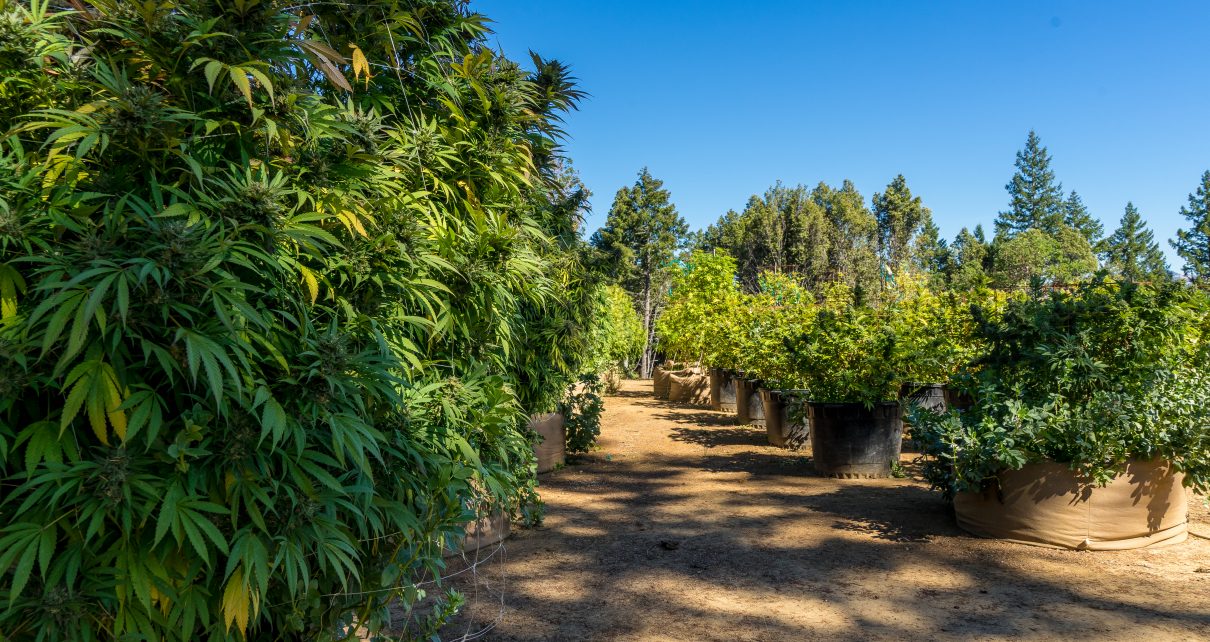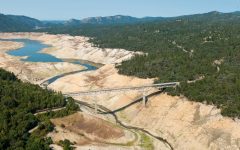
Cannabis or marijuana outdoors plantation growing on the mountains of North California. (Photo: Carlos Ramos, Shutterstock)
Legislation to Increase Penalties Against Cannabis Farms for Water Theft and Pollution
In an era of ever worsening draught, California’s water supply is more precious than ever
By Laura Hauther, June 9, 2022 10:25 am
Illegal cultivation of marijuana became the focus of law enforcement over the past few years as farms mushroomed throughout the state, often creating massive environmental damage through their use of fertilizers and pesticides and the illegal diversion of water.
In an era of ever worsening draught California’s water supply is more precious than ever and that’s made shutting down these operations a high priority for legislators. Cannabis plants can use up to six gallons a day per plant but as California’s desert areas are becoming hotter and more arid, plants need even more water to keep thriving.
Counties throughout California are passing measures to hit these growers with huge civil fines for grow operations, and now they’re adding penalties aimed specifically at water theft and pollution.
One of the counties hardest hit by illegal cannabis, San Bernardino, is now sponsoring legislation authored by State Senator Anna Caballero (D-Merced) to get statewide measures passed.
“Illegal cannabis farming is killing wildlife and wreaking environmental damage across the state,” Caballero said in a San Bernardino press release. “This bill will help stop the pollution of our groundwater supply and the theft of water, which are all the more important during an ongoing multi-year drought.”
The bill, SB 1426, include fines and possible jail time for tapping into a water conveyance or digging an un-permitted well. By including violations of the Fish and Game Code for polluting waters and harming wildlife, it also targets the harm done by fertilizers and pest control chemicals, like carbofuran.
San Bernardino is also supporting similar bill authored by Assemblywoman Blanca Rubio (D-Baldwin Park) and sponsored by Los Angeles County. The bill, AB 2421, raises penalties up to $25,000 for diverting or polluting waters and harming wildlife. The bill specifically mentions unlicensed cannabis grows as one of the main targets of these fines.
Intergral Ecology Research Center (IERC) set up a program to document and mitigate the harm from illegal grows throughout California. IERC co-founder and wildlife ecologist Greta Wengert said in an interview with NPR as illegal grows become dominated by cartels, the indiscriminate use of rodenticides and pesticides has exploded. Her research found contamination in the entire wildlife food web even in remote forestlands.
Water diversion alone can be devastating for fish and wildlife, according to IERC research. Many miles of plastic irrigation pipes have been removed from grows throughout the state; pipes that were draining rivers and streams and threatening fish populations.
In a recent press conference announcing a new crackdown on the illegal grows, LA County Sheriff Alex Villanueva said a minimum of 150 million gallons was needed to harvest the plants based on the number of farms in 2021.
Lancaster Vice Mayor Marvin Crist emphasized the new enforcement measures Sheriff Villanueva launched on May 17 were, “… mostly about water.”
Concentrated focus on breaking the hold illegal operations had on southern California’s desert areas is starting to move the needle; Villanueva said there are 350 illegal grows in the Antelope Valley, down from 750 last year and Operation Hammerstrike, San Bernardino’s cannabis enforcement program, reported a 40% drop in operating grow houses.
Read San Bernardino County’s Approach to Eradicating Illegal Cannabis May Go Statewide





5 thoughts on “Legislation to Increase Penalties Against Cannabis Farms for Water Theft and Pollution”